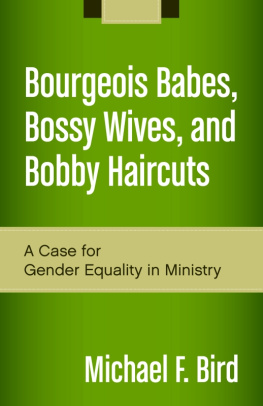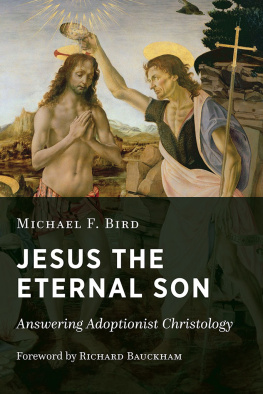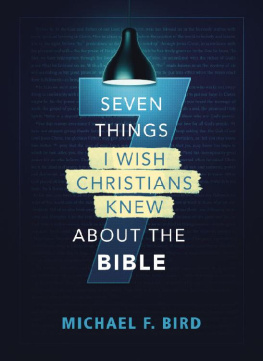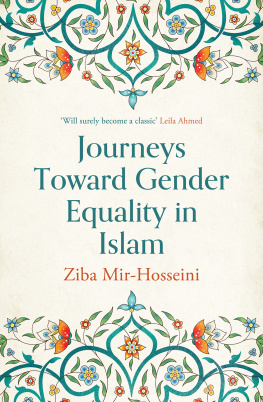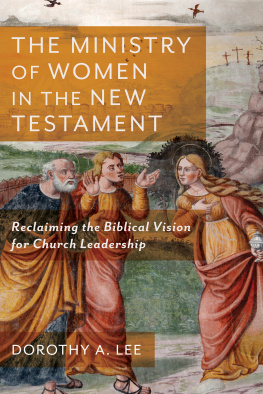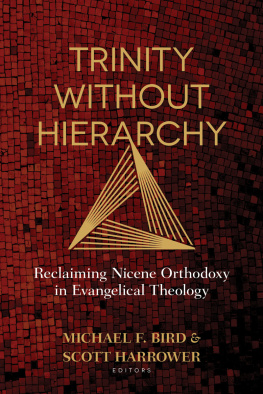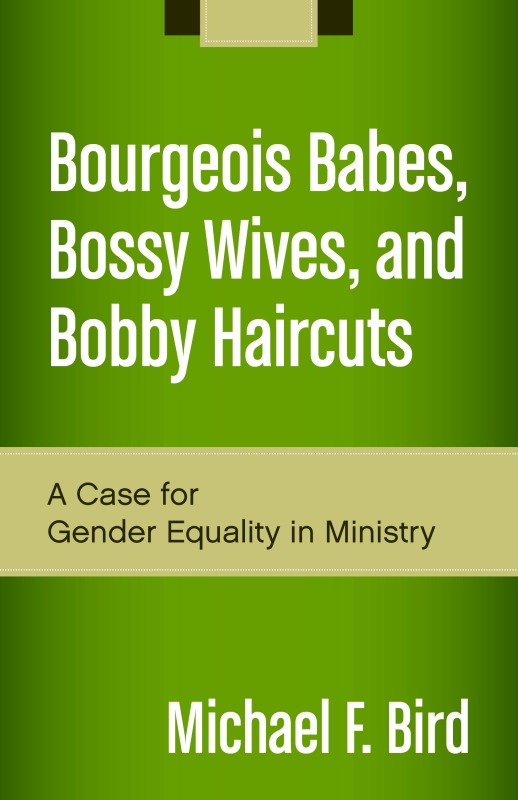
Bourgeois Babes, Bossy Wives, and Bobby Haircuts
A Case for Gender Equality in Ministry
Michael F. Bird
For Ben Witherington III
Who has done much to advance the gospel by advancing the ministry of women for the gospel.
Table of Contents
| BDAG | Bauer, Walter, and Frederick Danker, A Greek English Lexicon of the New Testament and Other Christian Literature (Chicago: University of Chicago Press, 2000) |
| BECNT | Baker Exegetical Commentary on the New Testament |
| CBQ | Catholic Biblical Quarterly |
| ESV | English Standard Version |
| EvQ | Evangelical Quarterly |
| ICC | International Critical Commentary |
| JB | Jerusalem Bible |
| JETS | Journal of the Evangelical Theological Society |
| JSNT | Journal for the Study of the New Testament |
| NCBC | New Century Bible Commentary |
| NCCS | New Covenant Commentary Series |
| NICNT | New International Commentary on the New Testament |
| NIGTC | New International Greek Testament Commentary |
| NIV | New International Version |
| NIVAC | NIV Application Commentary |
| NRSV | New Revised Standard Version |
| PNTC | Pillar New Testament Commentary |
| WBC | Word Biblical Commentary |
Many years ago the Baptist fundamentalist John R. Rice published a polemical booklet called Bobbed Hair, Bossy Wives, and Women Preachers, written to censure women for rebellious acts like cutting their hair. In fact, a woman cutting her hair was so rebellious that even the angels might be led into rebellion against God by imitating her example (yes, Rice actually said that!). For Rice, a worst-case scenario was probably something like a woman wearing pants with a Jacqueline Kennedy-style bobbed haircut, speaking from a pulpit, while her husband minded the kids in the nursery.
Stanley E. Gundry has mentioned how Rices booklet was important to his Baptist minister father, who harangued women in his congregation for outlandish behavior such as sharing unwanted opinions. Though Stan was raised a staunch patriarchalist, he was also instilled with a deep reverence for the truth of the Bible. Eventually he came to believe that the truth of the Bible permitted a place for women in pastoral ministry. Stan came to this view largely through the exegetical prodding and theological questioning of his wife, Patricia Gundry. Patricia in fact went on to write the book Women Be Free! an early evangelical manifesto for Christian egalitarianism.
Stans story is not unique, as many devout evangelical men and women of faith have had something of an epiphany on women and leadership that moved them toward a more inclusive view of ministry. I share in that story. Admittedly, I would demur with Stan and other egalitarians on some points of biblical interpretation, just as they would disagree with me. In my own journey with the biblical truth, Ive not been concerned with fitting into a particular camp or assenting to every item on a checklist that marks one as theologically kosher. In fact, my own position is either almost-complementarian or nearly-egalitarian, depending how you look at it.
Yet I have changed my view on women and ministry, and some of my friends have shaken their head in disappointment, thinking that I have sold out to the cultural tide of feminism by adopting a fashionably left-leaning version of evangelicalism. My own perspective is that I have simply followed the testimony of biblical texts that affirm women can and should be involved in pastoral care and the churchs teaching ministry. Let me tell you about my journey.
During my late teenage years, my views on women were largely shaped by military culture. I joined the Army at age seventeen and adopted the maxim of German philosopher Friedrich Nietzsche: Man shall be trained for war, and woman for the recreation of the warrior: all else is folly. Women were mainly sexual playthingsthough finding a bourgeois babe willing to satisfy my unbridled lusts was not particularly easy. Fortunately my conversion to Christ at age twenty led to change in a great many areas of my life, including my view of women and relationships. But in my early theological education I took to a patriarchal view very naturally. I was greatly influenced by complementarians such as John Piper, John MacArthur, and Wayne Grudemmen I still admire and respect even if I must now depart company from them on this issue.
As an undergraduate ministry student, I did not hesitate to voice my complementarian views during discussions among fellow students, friends, family members, and teachers. I will never forget the time an equally devout egalitarian woman called me a patriarchal, androcentric, chauvinistic misogynist. At the time I did not know what all those fancy words meant, but the saliva foaming at her mouth led me to think she was calling me something very, very bad. I also attended a conservative evangelical church that was strongly complementarian, to the point that it even forbade women ushers. Over the course of time, however, four significant events led me to doubt the complementarian position and, finally, to abandon it altogether.
First, I began to question why we never had female worship leaders in our Sunday worship services. After all, worship leader is not even a biblical office. Ephesians 4:1112 does not say that God gave some to be apostles, prophets, teaching-shepherds, and worship leaders. Moreover, I would hardly call worship leader a teaching ministry. I didnt understand the restriction, but I went along with it just to make extra sure that feminists didnt get a foothold in our church. At the same time, my church stopped allowing women to lead worship at midweek Bible studiesIm talking about a woman with a guitar picking three choruses for a group of eight people to sing in someones living room. I approached one of the pastors and was told the reason for the prohibition was that a worship leader leads worshipers into the presence of God; therefore, it needed to be a male role. But as I thought about it later, I remembered that a theme in Hebrews is how Jesus leads us all into the presence of God (see Heb. 4:16; 10:19, 35). What is more, surely the doctrine of the priesthood of all believers should preclude us from seeing anyone other than Jesus Christ as a mediator of access to God! My dear pastor had not convinced me, and doubts began to encroach upon my mind.
Second, my confidence in the biblical integrity of the complementarian ship was shaken simply by reading carefully Acts and the Pauline letters, in which it was evident that Paul had a lot of female coworkers. I got the impression they did more than teach other women, instruct children, and manage the flower arrangements. This sense was reinforced when I attended a Ben Witherington lecture on Romans 16 at Morling College, which not only confirmed my suspicions about Pauls female coworkers, but also challenged many of my complementarian assumptions.
Third, I finally said goodbye to complementarianism after hearing about what happened at the Together For the Gospel conference (T4G) in 2006. Initially this fantastic conference was open to both men and women, but after it began to fill up, the organizers stopped accepting applications from women. They even asked women to give up their places so that more men could attend. Given that this was a conference geared toward pastors, if only men can be pastors, those actions seemed to make sense. Butand this is what irked methe organizers of T4G did not request that
Next page
